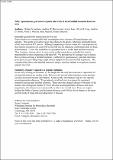Spontaneous generation of prion infectivity in fatal familial insomnia knock-in mice
Author(s)
Faas, Henryk; Watson, Nicki; Borkowski, Andrew W.; Jasanoff, Alan Pradip; King, Oliver D.; Steele, Andrew D.; Lindquist, Susan; Jackson, Walker S.; ... Show more Show less
DownloadJackson_Spontaneous generation.pdf (2.425Mb)
PUBLISHER_POLICY
Publisher Policy
Article is made available in accordance with the publisher's policy and may be subject to US copyright law. Please refer to the publisher's site for terms of use.
Alternative title
Spontaneous Generation of Prion Infectivity in Fatal Familial Insomnia Knockin Mice
Terms of use
Metadata
Show full item recordAbstract
A crucial tenet of the prion hypothesis is that misfolding of the prion protein (PrP) induced by mutations associated with familial prion disease is, in an otherwise normal mammalian brain, sufficient to generate the infectious agent. Yet this has never been demonstrated. We engineered knockin mice to express a PrP mutation associated with a distinct human prion disease, fatal familial insomnia (FFI). An additional substitution created a strong transmission barrier against pre-existing prions. The mice spontaneously developed a disease distinct from that of other mouse prion models and highly reminiscent of FFI. Unique pathology was transmitted from FFI mice to mice expressing wild-type PrP sharing the same transmission barrier. FFI mice were highly resistant to infection by pre-existing prions, confirming infectivity did not arise from contaminating agents. Thus, a single amino acid change in PrP is sufficient to induce a distinct neurodegenerative disease and the spontaneous generation of prion infectivity.
Date issued
2009-08Department
Massachusetts Institute of Technology. Department of Biological Engineering; Massachusetts Institute of Technology. Department of Brain and Cognitive Sciences; Massachusetts Institute of Technology. Department of Nuclear Science and Engineering; Whitehead Institute for Biomedical Research; Francis Bitter Magnet Laboratory (Massachusetts Institute of Technology)Journal
Neuron
Publisher
Elsevier Inc.
Citation
Jackson W.S., Borkowski A.W., Faas H., Steele A.D., King O.D., Watson N., Jasanoff A., Lindquist S. Spontaneous Generation of Prion Infectivity in Fatal Familial Insomnia Knockin Mice (2009) Neuron, 63 (4), pp. 438-450.
Version: Author's final manuscript
ISSN
0896-6273